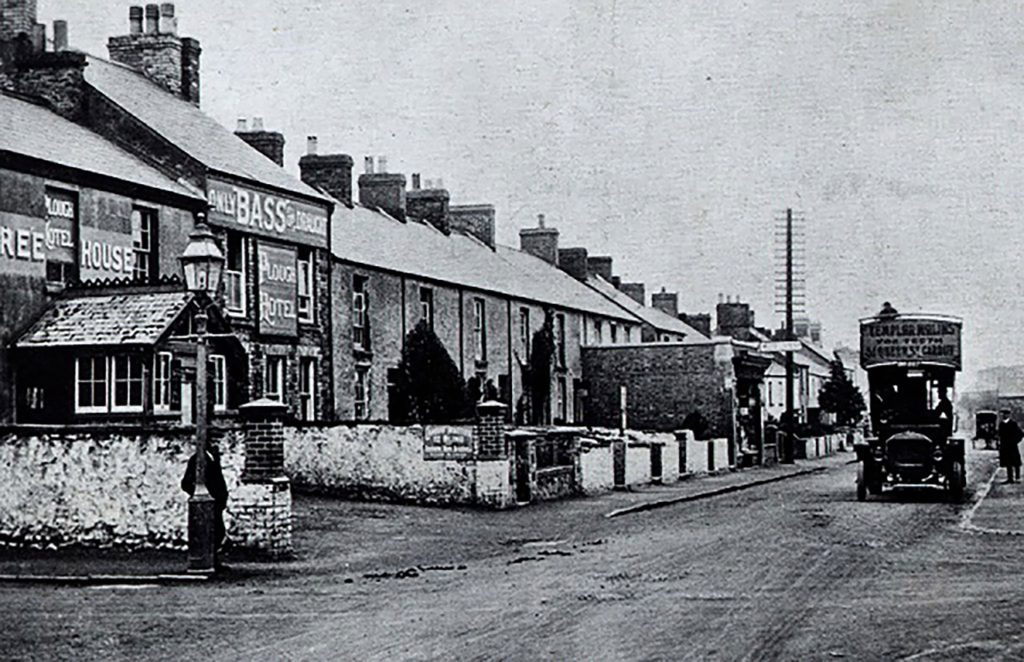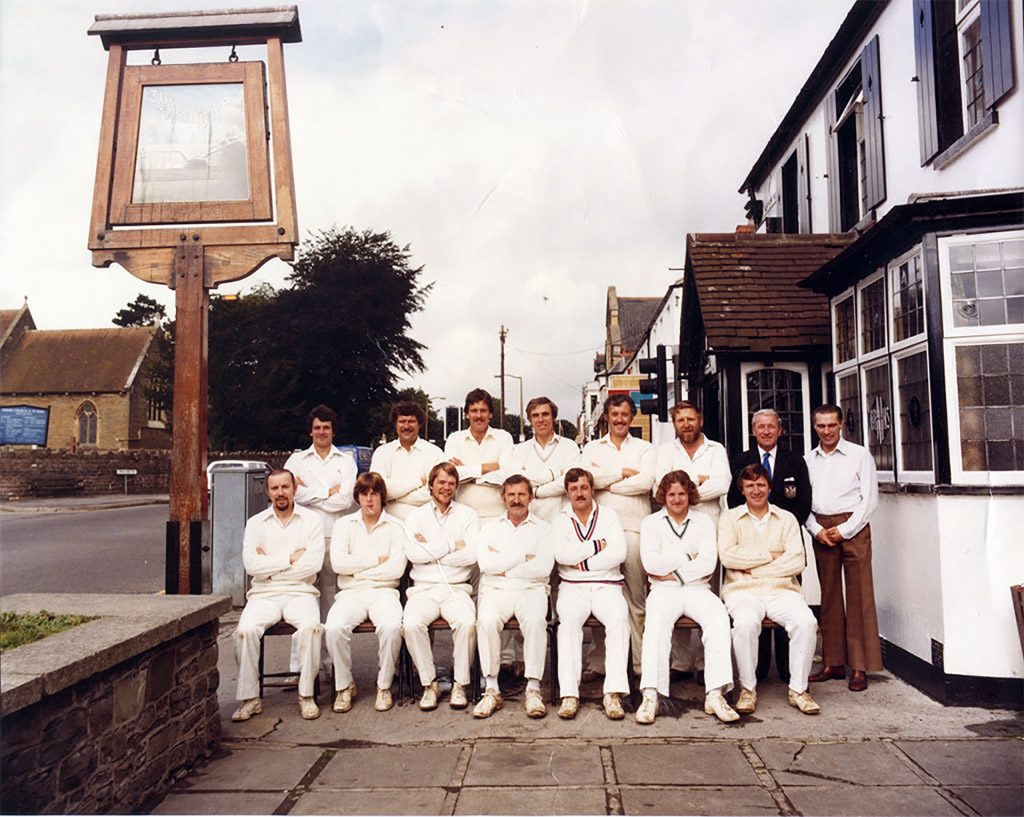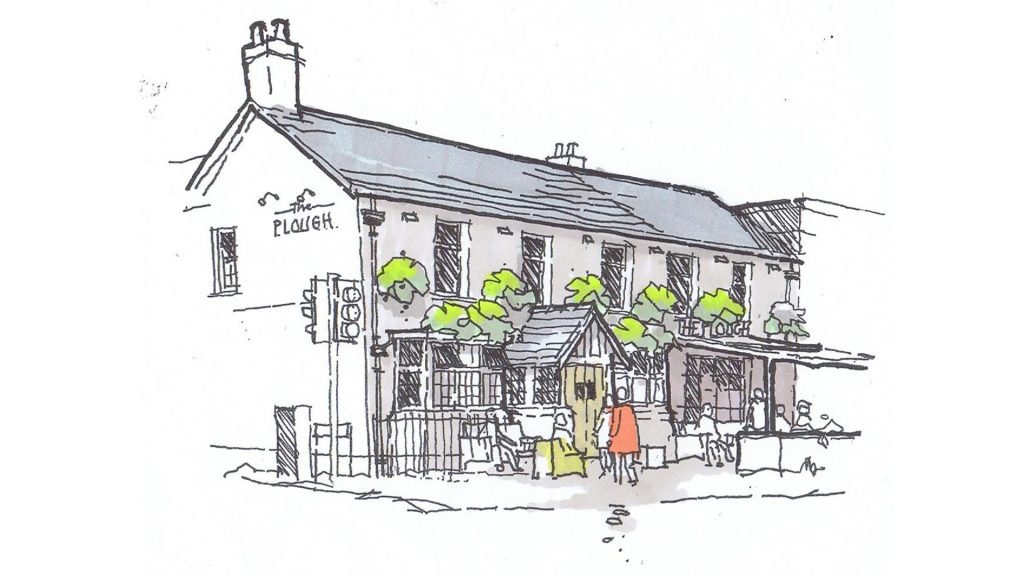The Plough: A History
One of Whitchurch’s well-known landmarks has a curious history. Nigel Lewis explains where the pub got is name and lots more
A pub has been on this prominent corner of Whitchurch village for over 170 years.
The sketch above shows the Plough, one of our most recognisable pubs, with patrons sitting outside. It wasn’t always like that though.
In the 1840s, a blacksmith called Reuben Lewis was living with his wife and family in a newly-constructed house on the corner, with his smithy off (old) Church Road. It was very prominent and busy, shoeing horses and making and repairing metal items for the local farmers.
Reuben was something of an inventor too. A newspaper article of 1848, reported that Reuben had invented a ‘novel plough’ and had demonstrated it on a field behind Whitchurch Common, to great local interest.
Over the next few years, Reuben won numerous prizes for his plough; he even exhibited it at the Great Exhibition at Crystal Palace in 1851 and won a prize!
It’s no surprise then that after that, we find him living in a pub, called ‘The Plough’, almost certainly named after his invention. Local expert Terry has suggested that Reuben actually displayed his plough over the front door of the pub, to entice customers in!
Why a pub you might wonder? Reuben had probably been brewing his own beer all the years previously; blacksmithing being a strenuous and thirsty job. And providing beer to his customers too, whilst they were waiting.
Business was obviously booming for Reuben and he was advertising for staff to work in the smithy; the word was getting around about his entrepreneurial talents. He built five cottages behind the pub (perhaps for his workers or local folk) and in all likelihood, moved the smithy and forge into the lane behind.
The five cottages are still there, but today form part of the pub restaurant and kitchen.
I guess that it was a common occurrence back then of pubs falling foul of the licensing laws, and in March 1856, the Cardiff and Merthyr Guardian reported that:
‘Reuben Lewis, beer-housekeeper of Whitchurch, was charged with keeping his house open for the sale of intoxicating liquors in prohibited hours on Sunday 10th of February. This was a third offence and the defendant was fined 20 shillings, with seven shillings and sixpence costs’.
Until the middle of the last century, you couldn’t drink in a pub in Wales on a Sunday, unless you were a ‘bona-fide’ traveller. Lots of locals over the years tried to blag their way out of the ‘Sunday drinking’ rules, protesting that they were not locals (the local bobbies always knew differently of course!).
Reuben continued with his inventing/blacksmithing and won another award in 1858 for his plough from the Bath and West of England Society. By 1860, he was advising that the premises now had steam power to meet the increased demand for his ploughs, harrows, drags (whatever they were!), scarifiers, clod crushers (ditto) and the like.

However, Reuben’s story as a successful businessman didn’t last. This was a time when mechanisation and technology was advancing rapidly, and probably, Reuben just couldn’t keep pace. He was threatened with bankruptcy, all culminating with a sale-by-auction in 1864. The lots included the pub, brewhouse, blacksmith’s shop, foundry and the five cottages. That seems like everything.
What happened to Reuben’s wife and family? I hope that they stuck with him.
After Reuben’s time, the Plough was taken over by a man called William Williams (his nickname was ‘Bill Twice’).
As a postscript, there was another newspaper article of September 1866 (two years after Reuben’s bankruptcy). The report states:
‘John Phillips, a gentleman with a penal servitude caste of features(!) was charged with stealing money from an old man named Reuben Lewis’.
It seems that Reuben, travelling back from Canton turned into the Rollers Arms in Llandaff Yard, and fell asleep in the pub toilet. Whilst asleep, John Phillips robbed Reuben of 25 shillings and ran away.
The wife of the pub landlord and her son were witnesses to the crime. He was spotted behind the Town Hall in Cardiff and was arrested whilst trying to escape again. The Bench committed John Phillips for trial, noting that he had previously been convicted of highway robbery and nine times of minor offences.
I wonder what happened to John Phillips or Reuben after that? I bet that Reuben didn’t get his 25 shillings back though.
Over the years (and without Reuben and the smithy), the Plough expanded to take in the adjacent shop. There’s an old photograph taken from the tower of St Mary’s Church of the Plough having expanded into the adjacent property (the one with the higher roof). Another photograph of similar vintage shows the Plough with huge advertisements for Bass beer.

Through two world wars, the Plough served beer for a number of different brewers, and no doubt, fell foul on numerous occasions for licensing offences. Does anyone know of tales from those times?
In the course of time, SA Brains acquired the Plough and recently added a restaurant and outdoor seating, developing the pub that we see today.
Nigel Lewis is a member of AWEN@thelibrary (awen.cymru@gmail.com)

